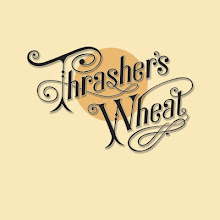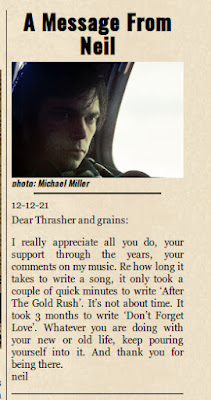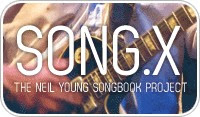"Oh! Susanna": The Story Behind The Song Continues

Americana by Neil Young & Crazy Horse
One of the bigger surprises from Bridge 2011 weekend was the pairing of Dave Matthews & Neil Young on "Oh! Susanna".
For many, this was a concert highlight.
Above is the video for The Big 3's "The Banjo Song (Oh Suzanna!)" from 1963.
As we mentioned recently, with all of the anticipation for the upcoming album Americana by Neil Young & Crazy Horse, there's been a lot of focus on the song "Oh! Susannah".
Yesterday, we posted the campy Bananarama cover of "Venus" which is a cult classic YouTube video by Shocking Blue which is based off of the Americana tune "Oh! Susannah" and its riffs. "Venus" was written by Robbie van Leeuwen and originally recorded by Shocking Blue for their 1969 album, "At Home".
And just as we were reminded about The Byrds version of "Oh Susanna" and James Taylor with Johnny Cash's version of "Oh Susanna" along comes another "Oh Susanna" version.
And as the legacy and history of "Oh! Susanna" continues to flap around on The Judgement Not To Pre-Judge "Americana", here's a comment by Matt & Jes Wedding:
First off, no one is snickering at Neil. Nor are they snickering at James Taylor because he didn't give a 15 minute lecture on "the history of the song Oh! Suzanna" before he played it live. Song meanings change over time. The original intent and malice that the song was written with and for is no longer present in the current incarnation of the song in our collective "Americana." Is it interesting to see where the song originally came from and how it has changed over time? Yes. But if this song has become "illegal" to reproduce in your mind because an old version of the song (which is not what Neil is playing) was racist, then there are a whole lot of other things that should be "illegal" as well. As I stated, song meanings change over time. This one has had 150 years to churn away in the collective American psyche, and in the mid-60s was reborn as a different song with a different meaning...you know, the version that EVERYONE knows. Not the original version that NO ONE knows. In a much more recent example of song meanings and change over time, think about Eddie Vedder and the song "Alive." Here is Ed recounting how the song has changed during VH1 storytellers, from twofeetthick.com: Ed retells the story of “Alive” saying “it’s a song about someone I know very well (laughs) … Ok, it’s about me” and goes on to say how the chorus is sung by fans with exuberance and it has trancended from being a song about a curse, to being an uplifting song. He concludes with “you changed the meaning of the song, you lifted the curse” And it only took 15 years to completely reverse and change the meaning of the entire song. Different circumstances, sure, but same idea. So snicker away if that helps you. I just don't see the point in living life stuck in 1830.More on "Oh! Susanna": The Story Behind The Song

Set for a June 5th release, you can now pre-Order "Americana" on Amazon.com
Labels: crazy horse, neil young































 Human Highway
Human Highway

















 Concert Review of the Moment
Concert Review of the Moment





 This Land is My Land
This Land is My Land

 FREEDOM In A New Year
FREEDOM In A New Year









 *Thanks Neil!*
*Thanks Neil!*




![[EFC Blue Ribbon - Free Speech Online]](http://www.thrasherswheat.org/gifs/free-speech.gif)











 The Unbearable Lightness of Being Neil Young
The Unbearable Lightness of Being Neil Young Pardon My Heart
Pardon My Heart



 "We're The Ones
"We're The Ones  Thanks for Supporting Thrasher's Wheat!
Thanks for Supporting Thrasher's Wheat!




 This blog
This blog 
 (... he didn't kill himself either...)
#AaronDidntKillHimself
(... he didn't kill himself either...)
#AaronDidntKillHimself









































































 Neil Young's Moon Songs
Neil Young's Moon Songs




 Civic Duty Is Not Terrorism
Civic Duty Is Not Terrorism Orwell (and Grandpa) Was Right
Orwell (and Grandpa) Was Right


 What's So Funny About
What's So Funny About 



4 Comments:
I like Matt and Jess Weddings' comment. Of course it's entirely up to the artist which songs he will or will not perform, and while I can understand and to a degree sympathize with the desire not to play "Oh Susanna" in a general context, it also well established as part of part of the musical fabric of Americana, which is what it seems Neil wishes to present with this new album. 'Oh Susanna' has a valid and noteworthy place in our musical history, and although it is a product of its times, like many folk songs, its racist origins--although they should not be forgotten--are not why it stays with us today.
True to the folk process, it has evolved beyond and arguably transcended for many its original role as a piece of the crude and unbecoming minstrelsy tradition. Its lyrics have changed over time, eliminating the original bigoted language and distasteful racist lyrics (and in Neil's new version, even, apparently the original tune). From the version I first heard as a kid, which is still published in most folk music collections I've seen, one would probably never associate the song with racism if one did not know of its origins. I simply don't think that's what it means to most people anymore. If anyone cares, I can post a link to webpage posting the original and revised lyrics side by side. In Stephen Foster's 1847 original, the lyrics are full of the same irritating "colloquialisms" used by white songwriters in other folk songs to present demeaning caricatures of black people, along with a verse depicting gross violence upon black people, which was since been thankfully excised.
The original song was certainly a product of its times, as Stephen Foster (who also wrote many far better songs in my opinion) was a man of his times. But for most people, it has far transcended that meaning since then, and certainly has an important place when it comes to an overview of American folk music. Although I've yet to hear the album, I tend to think Neil is including it on this album to present a more complete panorama of American folk music and Americana, and it remains to be seen just how conceptual his use of the song may be.
Fascinating.
It's also noteworthy that Stephen Foster himself turned away from writing the minstrel songs he began his career with, and may have even tried to make up for it by writing one or two songs later on in his career that project a more favorable image of black folk, at least within the context of his time.
Nellie was a Lady apparently describes a black woman in a way that, according to a friend of mine who studied Foster for some time, appears to attempt to compensate, or in a way apologize, for the minstrel songs he wrote, which he may have come to view in an unfavorable light as he grew older.
I don't know how relevant it is to the nature of the song itself that the author may have come to see the great wrong in it over time, much how we as a society have also changed our own perspective on it as well.
Re-imagining the song in the 60's and stripping it of its racism as an attempt to mold it to reflect more modern values is one way we challenge the fearful ignorance of past attitudes, and I believe that, if what I said about Stephen Foster is correct, he likely would approve.
It's not too surprising to me that no one has mentioned that the woman in "The Big Three" is Mama Cass Elliot.
After all, she did introduce the "Fab Three" to each other, which later became the "American Fab Four".
It's my bet that Stephen Foster heard this song from some black musician, morphed it into his own, and through the ages up to and beyond "The Big Three" version, is what a lot of musicians do. They nick riffs from others and turn it into their own "version".
The Beatles did it and so does Neil. In fact, Neil does it to himself. I remember back in'92, Neil started the song "You and Me" and some dude in the audience was blown away it wasn't "Old Man". Hey, it's all one song.
Arthur - Very good points. Interesting thing about Mama Cass too. I hadn't thought of the angle of the song being stolen from a black musician.
Very true about the "borrowed tune" aspect of music. It just came to light for me that Led Zeppelin made a living at it without even acknowledging the contributions of the original authors whose tunes they reworked into their own "originals".
Post a Comment
<< Home